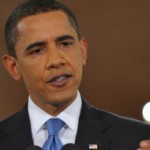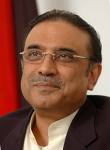Thursday
Apr302009
Obama Press Conference: Nailing Torture, Trashing the Pakistani Government
 Thursday, April 30, 2009 at 9:23
Thursday, April 30, 2009 at 9:23
Related Post: Pakistan - Who's in Charge?
Video and Transcript: President Obama “Day 100″ Press Conference (29 April)
 President Obama offered an excellent presentation in Wednesday night's press conference. He was in command, fluently moving from his opening agenda on swine flu and the economy to questions on foreign policy, the US auto industry, and the financial sector. He even dealt effectively with the puffball question, courtesy of a New York Times correspondent, "What has surprised you the most about this office? Enchanted you the most from serving in this office? Humbled you the most? And troubled you the most?"
President Obama offered an excellent presentation in Wednesday night's press conference. He was in command, fluently moving from his opening agenda on swine flu and the economy to questions on foreign policy, the US auto industry, and the financial sector. He even dealt effectively with the puffball question, courtesy of a New York Times correspondent, "What has surprised you the most about this office? Enchanted you the most from serving in this office? Humbled you the most? And troubled you the most?"
Obama said little about foreign policy and security in his initial statement, dealing with the immediate health crisis and the Federal Government's budget, but the third question put him on the spot over torture:
I half-expected the President, given the Administration's back-and-forth over the last 10 days on whether to press charges against any Bush officials, to flinch. He didn't. To use baseball language, he knocked the question out of the park.
Yes, it was torture. And whether it had any effect is tangential, given the damage done to America's counter-terrorist efforts and its standing in the world.
Obama invoked Winston Churchill --- and who in the US could hate Churchill? --- who "said, 'We don’t torture,' when the entire British — all of the British people were being subjected to unimaginable risk and threat". The President avoided the trap of commenting on which Bushman "sanctioned torture", but he turned the main talking point of Bush defenders, "Torture helped win the War on Terror", against them:
I am sceptical that Obama will be closing Guantanamo Bay this year. And I still have concerns --- serious concerns --- about other US detention facilities, such as Camp Bagram in Afghanistan. But, at least on the narrow issue of whether there is any rationale for "torture", the President signed, sealed, and delivered the appropriate response.
In foreign policy, two specific cases arose: Iraq and Pakistan. On the former, Obama easily held the line, despite the continuing bombings and political instability in and beyond Baghdad:
(The questioner, Jeff Mason, let Obama off the hook. The emerging issue is whether the US military will have troops in and just outside Iraqi cities well past the summer deadline for withdrawal.)
Pakistan, however, offered a far more serious exchange, the significance of which has been missed so far by the media. It started with a sensationalist, and thus potentially useless question:
The President batted that scenario straight back, "I’m confident that we can make sure that Pakistan’s nuclear arsenal is secure." Then, however, he offered two very clear signals.
First, his Administration is standing behind the Pakistani military and encouraging it to take the lead in the fight against insurgency. Pakistan's nuclear arsenal is safe "primarily, initially, because the Pakistani army, I think, recognizes the hazards of those weapons falling into the wrong hands. We’ve got strong military-to-military consultation and cooperation." What's more....
Second, while Obama and his advisors are placing their strategic chips on the military, they have little faith in the current Pakistani Government:
Obama's statement was not off-the-cuff. It was the next step, after statements by Secretary of State Hillary Clinton and Secretary of Defense Robert Gates, that Islamabad better get its act together to take on "the Taliban" and "Al Qa'eda" or its politicians can be put to the side.
If Pakistani President Zardari is not convinced, he will do well to consider Obama's concluding challenge:
Of course, Obama never said "coup", but as Washington ramps up the fight against insurgents in both Afghanistan and Pakistan, he sent out the message.
Zardari is disposable. The Pakistani military is not.
Video and Transcript: President Obama “Day 100″ Press Conference (29 April)
 President Obama offered an excellent presentation in Wednesday night's press conference. He was in command, fluently moving from his opening agenda on swine flu and the economy to questions on foreign policy, the US auto industry, and the financial sector. He even dealt effectively with the puffball question, courtesy of a New York Times correspondent, "What has surprised you the most about this office? Enchanted you the most from serving in this office? Humbled you the most? And troubled you the most?"
President Obama offered an excellent presentation in Wednesday night's press conference. He was in command, fluently moving from his opening agenda on swine flu and the economy to questions on foreign policy, the US auto industry, and the financial sector. He even dealt effectively with the puffball question, courtesy of a New York Times correspondent, "What has surprised you the most about this office? Enchanted you the most from serving in this office? Humbled you the most? And troubled you the most?"Obama said little about foreign policy and security in his initial statement, dealing with the immediate health crisis and the Federal Government's budget, but the third question put him on the spot over torture:
You’ve said in the past that waterboarding, in your opinion, is torture....Do you believe that the previous administration sanctioned torture?
I half-expected the President, given the Administration's back-and-forth over the last 10 days on whether to press charges against any Bush officials, to flinch. He didn't. To use baseball language, he knocked the question out of the park.
What I’ve said — and I will repeat — is that waterboarding violates our ideals and our values. I do believe that it is torture.... And that’s why I put an end to these practices.
I am absolutely convinced it was the right thing to do, not because there might not have been information that was yielded by these various detainees who were subjected to this treatment, but because we could have gotten this information in other ways, in ways that were consistent with our values, in ways that were consistent with who we are.
Yes, it was torture. And whether it had any effect is tangential, given the damage done to America's counter-terrorist efforts and its standing in the world.
Obama invoked Winston Churchill --- and who in the US could hate Churchill? --- who "said, 'We don’t torture,' when the entire British — all of the British people were being subjected to unimaginable risk and threat". The President avoided the trap of commenting on which Bushman "sanctioned torture", but he turned the main talking point of Bush defenders, "Torture helped win the War on Terror", against them:
[Banning torture] takes away a critical recruitment tool that Al Qaida and other terrorist organizations have used to try to demonize the United States and justify the killing of civilians. And it makes us — it puts us in a much stronger position to work with our allies in the kind of international, coordinated intelligence activity that can shut down these networks.
I am sceptical that Obama will be closing Guantanamo Bay this year. And I still have concerns --- serious concerns --- about other US detention facilities, such as Camp Bagram in Afghanistan. But, at least on the narrow issue of whether there is any rationale for "torture", the President signed, sealed, and delivered the appropriate response.
In foreign policy, two specific cases arose: Iraq and Pakistan. On the former, Obama easily held the line, despite the continuing bombings and political instability in and beyond Baghdad:
Athough you’ve seen some spectacular bombings in Iraq that are a — a legitimate cause of concern, civilian deaths, incidents of bombings, et cetera, remain very low relative to what was going on last year, for example. And so you haven’t seen the kinds of huge spikes that you were seeing for a time. The political system is holding and functioning in Iraq.
(The questioner, Jeff Mason, let Obama off the hook. The emerging issue is whether the US military will have troops in and just outside Iraqi cities well past the summer deadline for withdrawal.)
Pakistan, however, offered a far more serious exchange, the significance of which has been missed so far by the media. It started with a sensationalist, and thus potentially useless question:
Can you reassure the American people that if necessary America could secure Pakistan’s nuclear arsenal and keep it from getting into the Taliban’s hands or, worst case scenario, even al Qaeda’s hands?
The President batted that scenario straight back, "I’m confident that we can make sure that Pakistan’s nuclear arsenal is secure." Then, however, he offered two very clear signals.
First, his Administration is standing behind the Pakistani military and encouraging it to take the lead in the fight against insurgency. Pakistan's nuclear arsenal is safe "primarily, initially, because the Pakistani army, I think, recognizes the hazards of those weapons falling into the wrong hands. We’ve got strong military-to-military consultation and cooperation." What's more....
On the military side, you’re starting to see some recognition just in the last few days that the obsession with India as the mortal threat to Pakistan has been misguided, and that their biggest threat right now comes internally. And you’re starting to see the Pakistani military take much more seriously the armed threat from militant extremists.
Second, while Obama and his advisors are placing their strategic chips on the military, they have little faith in the current Pakistani Government:
I am gravely concerned about the situation in Pakistan....The civilian government there right now is very fragile and don’t seem to have the capacity to deliver basic services: schools, health care, rule of law, a judicial system that works for the majority of the people.
Obama's statement was not off-the-cuff. It was the next step, after statements by Secretary of State Hillary Clinton and Secretary of Defense Robert Gates, that Islamabad better get its act together to take on "the Taliban" and "Al Qa'eda" or its politicians can be put to the side.
If Pakistani President Zardari is not convinced, he will do well to consider Obama's concluding challenge:
We will provide them all of the cooperation that we can. We want to respect their sovereignty, but we also recognize that we have huge strategic interests, huge national security interests in making sure that Pakistan is stable and that you don’t end up having a nuclear-armed militant state.
Of course, Obama never said "coup", but as Washington ramps up the fight against insurgents in both Afghanistan and Pakistan, he sent out the message.
Zardari is disposable. The Pakistani military is not.

 Question of the Day: Who is the most important "reliable" leader in Pakistan?
Question of the Day: Who is the most important "reliable" leader in Pakistan? The political situation in Pakistan has twisted once again.
The political situation in Pakistan has twisted once again. Prominent cleric Sufi Mohammad (pictured) has announced that
Prominent cleric Sufi Mohammad (pictured) has announced that  Lost amidst the attention to President Obama's trip in Europe, another US tourist,
Lost amidst the attention to President Obama's trip in Europe, another US tourist,